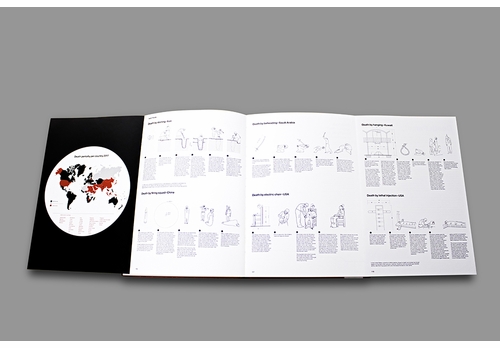| RECENT POSTS DATE 1/14/2025 DATE 1/2/2025 DATE 12/31/2024 DATE 12/26/2024 DATE 12/24/2024 DATE 12/18/2024 DATE 12/17/2024 DATE 12/14/2024 DATE 12/12/2024 DATE 12/12/2024 DATE 12/8/2024 DATE 12/8/2024 DATE 12/7/2024
| | | BRIDGET LESLIE | DATE 4/15/2018On a spring day, while sitting on a bench, you adjust your arm so that it is resting along the thin metal divider between each seat. This simple gesture is something that you would never think to reflect upon—the seat is comfortable enough for temporary leisure; you don't ponder its existence before or after engagement with it. But if you were looking for a place to sleep, perhaps you would question this sly design element that has made your quest impossible.
New from Lars Müller, Handbook of Tyranny—by architect, writer and designer of socio-cultural maps and studies, Theo Deutinger—is a fascinating compendium of nonfictional illustrations depicting the despotic nature of institutional design meant to control human behavior. Deutinger's renderings represent the acute bureaucratic laws and regulations that condition our experiences in everything from architecture to social interaction, pointing out, over 160 graphically clear pages, the profound lack of humanity inherent to systems of globalization that refuse to acknowledge that our world is made up of individuals.
Deutinger opens his Introduction with a line from a David Bowie song: "Where are we now?" The lyric acts as a call to arms, asking the reader to reflect upon this moment in time, when "for every obstacle to organizing and controlling society, there seems to be a technical solution at hand." Deutinger challenges the reader to be curious, and to stand firm as a society with the response, "Here we are."
Sections of the book are organized by such loaded subjects as: Crowd Control, Defensive City, Prison Cells and Death Penalty, to name a few. Each section commences with a text breaking down the socio-political nature of the category.
In the chapter Defensive City, Deutinger likens cities to modern day fortresses, where unwanted behavior that isn't punishable by law is instead prevented by subtle design changes to public space. Deutinger's hyper-articulate illustration of a city street unveils many hidden layers of malignant superintendence, and the political, territorial and systematic powers behind them.
One graphic illustrates the average size of prison cells around the world. The United States falls somewhere in the middle at 6.5 meters squared; however, the U.S. houses a quarter of the world's prison population. Here, and throughout the book, it is not the graphic that is shocking, but the suddenly crystal-clear facts themselves.
THEO DEUTINGER is an architect, writer and designer of socio-cultural maps and studies. He is founder and head of TD, an office that combines architecture with research, visualization and conceptual thinking in all scale levels from global planning, urban master plans, architecture to graphical and journalistic work. Deutinger has developed "Snapshots of Globalization"—multilayered illustrations and maps that represent the world in this very particular moment. He is known for his writings about the transformation of Europe’s urban culture through consummation and the influence of media. Deutinger’s work is frequently published in various magazines like Mark, Wired and Domus, and has been exhibited at various occasions like Future Fictions Z33 (Hasselt, 2014), Bi-City Biennale of Urbanism/Architecture (Shenzhen/Hong Kong 2014) and the 14th Architecture Biennale in Venice (Italy 2014).
BRIDGET MOREEN LESLIE is an Australian born, NYC-based artist with a focus on installation, sound, light and writing. She is interested in collapsing spatial and psychological barriers between class, noise, time, fashion, location, and body language. She received her BFA from Sydney College of the Arts, Sydney University, and her MFA from Parsons School of Design, New York.
Photographs of Handbook of Tyranny are by ANDI JANOFSKY.
 Lars Müller Publishers
Hbk, 8.25 x 11.75 in. / 160 pgs / 987 color.
| |
|







